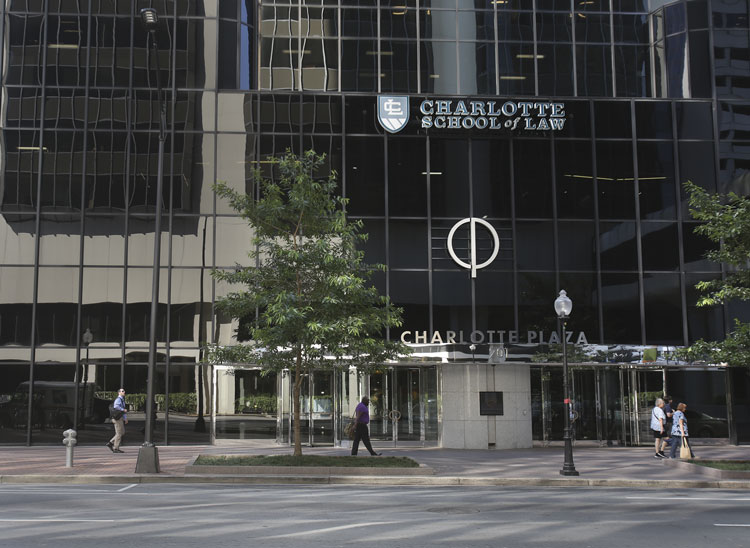Some ex-students join Charlotte School of Law in limited settlement fund motion

The now-shuttered Charlotte School of Law./Albert Dickson. (ABA Journal file photo).
Updated: A joint motion to settle a proposed class action brought by former students of the shuttered for-profit Charlotte School of Law was filed Tuesday with one group of plaintiffs opting not to join.
The school agreed to pay $2.65 million for a limited settlement fund, Law360 reports. The action filed in U.S. District Court for the Western District of North Carolina accuses the law school of misrepresenting its American Bar Association accreditation issues to students and prospective students. The class is comprised of individuals who enrolled in, paid tuition or fees, or attended the school between Sept. 1, 2013 and Aug. 15, 2017.
According to the joint motion, the settlement does not prevent plaintiffs from seeking student debt relief under the U.S. Department of Education’s Closed School Discharge or Borrower Defense to Repayment programs.
In December 2016, three federal court actions were filed by current and former students against the school shortly after it was put on probation by the council of the ABA’s Section of Legal Education and Admissions to the Bar, and after the Department of Education pulled the school’s access to student loans upon finding that it had made “substantial misrepresentations” regarding compliance with ABA accreditation standards.
The law school closed in August 2017 after the council rejected its proposed teach-out plan.
A defense motion to consolidate the three actions was granted in October 2017. A group of plaintiffs from the original Barchisi v. Charlotte School of Law filing, objected and didn’t join Tuesday’s proposed settlement agreement motion, which seeks limited-fund certification.
Gary Shipman, a North Carolina lawyer whose clients are in the original filing, told the ABA Journal in an email that the proposed agreement does not meet U.S. Supreme Court requirements regarding limited fund settlements.
“There’s been very limited discovery undertaken; and the settlement provides payments to some proposed class members that really have no claims, and only token payments to class members who do,” he wrote, adding that he does not think the judge will approve the proposed settlement.
The law school has “very limited assets,” according to Tuesday’s motion. Most of the settlement fund would come from the school’s remaining insurance money, with an additional $150,000 contribution from defendants. The motion estimates that there could be as many as 2,500 people in the class.
“Even assuming each class member received the average of just one year in tuition and fees, the settlement class’ alleged compensatory damages exceed $105 (million)—before trebling and attorneys’ fees, which plaintiffs seek under (the Uniform Deceptive Trade Practices Act,)” the motion states.
In May, Charlotte School of Law and other InfiLaw Corp. schools—Arizona Summit Law School and Florida Coastal School of Law—sued the ABA, arguing that the association violated the schools’ due process rights on accreditation matters. Out of the three schools, only Florida Coastal has not been placed on probation by the ABA. Kirkland & Ellis represents the law schools in those cases.
See also: “How can the ABA improve law school compliance after CSL closure?”
“Defendants have agreed to include 100 percent of the net proceeds of any judgment or settlement payment from that litigation in the settlement fund,” Tuesday’s motion states.
Charlotte School of Law also faces more than 90 state court actions filed by former students. Gary Jackson, who represents those students, told the ABA Journal on Wednesday that if the proposed federal settlement sweeps in his clients, they will file an objection.
“InfiLaw still has the Florida law school, which is a viable entity, and it’s paying lawyers to sue the ABA,” he said. “What’s curious to me is that they’ve hired Kirkland & Ellis in three different lawsuits, in three different federal jurisdictions. Somebody is paying that firm, and we know that it is an expensive proposition.”
According to Tuesday’s motion, Charlotte School of Law incurred a net loss of over $8 million in 2017, and InfiLaw showed a pre-tax loss of more than $7 million in 2017 and more than $6 million through June 2018. The motion identifies InfiLaw’s parent company as “Holding,” and states that it had a pretax loss of more than $9 million in 2017.
In earlier court documents investors in InfiLaw’s parent company have been identified as Sterling Capital Partners L.P. and Sterling Capital Partners GMBH & CO. The court in July 2017 dismissed the Sterling entities as defendants in the CSL action
“CSL has all along characterized InfiLaw Corp. as its parent, and InfiLaw Holdings as its grandparent, as has Florida Coastal and Arizona Summit,” Jackson said Wednesday. “Really all this is a structure from Sterling to try to insulate itself from liability as you go up the ladder. The only thing InfiLaw Holdings was was a conduit from InfiLaw Corp., through which InfiLaw Holdings would pass on profits of the school to Sterling.”
David Mills, a Cooley partner who represents Charlotte School of Law in the North Carolina class action, did not respond to an ABA Journal request for comment.
Updates with comments from Gary Shipman at 6:27 a.m.



